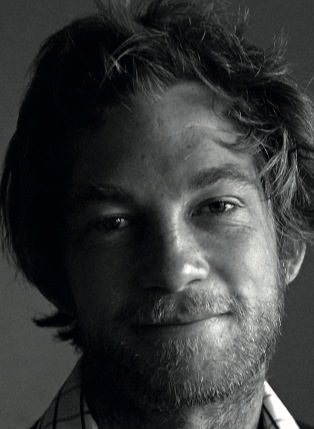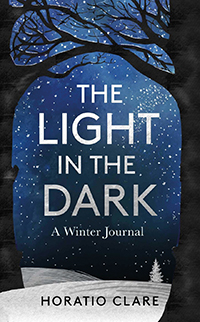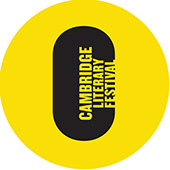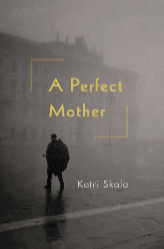Bringing you top new fiction picks, author interviews, discounts and lots more book chat, the Edition Book Club is a partnership with Cambridge Literary Festival and Heffers
The Light in the Dark: a Winter Journal
by Horatio Clare
This month’s book choice is a hymn to the darkness of winter and to the power of the human spirit to overcome it
Interview by Charlotte Griffiths 
The Light in the Dark takes the form of a diary, following writer Horatio Clare’s progress through the winter months, dropping in on him every couple of days or so to check in – as you might do with a friend who’s struggling.
Following a professionally challenging year, including a hard winter in which he went “mad with depression”, we join Horatio at the end of the summer of 2017, where he has resolved to write this book as a torch raised against the darkness and “embrace this winter like a summer.” He writes: “Depression kills your power of vision, but I will practise looking and looking outwards like an exercise, as though I am training for an expedition… I will not lose touch with nature… This diary is a refuge, a thing to do, something to put work and time into, a defence against the hopelessness.”
Following the great tradition of British nature writing, The Light in the Dark’s chapters include passages of meditative, heartfelt prose describing the effects of the passing seasons that tips on the edge of a stream of consciousness: “It does not do to romanticise drizzle, rain on motorways, months of strip-lighting, office windows black at four o’clock, concrete skies, sock-damp, rain-prickle, mould-steam, deadbeaten fields, sodden livestock and the chilly tug like food-sucking mud that winter can exert upon the spirit.”
Passages seamlessly slip from lyrical observation of the natural world to recording the humdrum of the daily grind: Horatio’s days are divided between his workplace at the University of Liverpool, where he spends a few days each week teaching writing and mentoring students, and his home’s attic in Hebden Bridge, where the majority of his writing takes place. We follow him riding ancient trains across the Pennines, spending the occasional evening stuck in the somewhat grim-sounding Adelphi Hotel in Liverpool, preparing for and celebrating Christmas with his family, then head-on facing the raw bleaknessof the first few months of the year.
Recording an incident involving his mother’s beloved sheep leads Horatio to reflect on his childhood growing up on a hill farm in Wales and being cut off by snow for weeks: which his inner younger self recalls as the “greatest adventure for small boys”. Horatio continually draws out references to the past – reflecting on paleolithic porridge consumption or the supposed experiences of the Brontës, growing up in nearby Haworth – or examining vignettes of his own adventures, his actions and choices, which he alludes to in a later passage: “Our minds filter and tint the past, turning it so it catches the light,” he writes. “Most involuntary memories are happy ones… and so we are granted forwardness and direction. Depression, seasonal and otherwise, turns all this upside down: the past is a guilty place, the future a hanging threat, the present is a humiliation. Stop it, you want to shout. Just stop it. Let me be.”
 One of the reactions to the book which surprised the writer most was the outpouring of concern for his own wellbeing, especially as the UK is very much in the grip of winter once more.
One of the reactions to the book which surprised the writer most was the outpouring of concern for his own wellbeing, especially as the UK is very much in the grip of winter once more.
“People keep asking ‘Are you ok?’ – and I’m fine,” he says, adding that an extraordinary number of people also battling seasonal depression have reached out to him since the book’s publication; not for any solution, but simply to be heard. “The ‘winter blues’ affect around 15{b486c5a37ab2d325d17e17d701cb2567b1ecd1814e8ceb33effa2a4f1f171d46} of people, and then 6{b486c5a37ab2d325d17e17d701cb2567b1ecd1814e8ceb33effa2a4f1f171d46} of those have actual Seasonal Affective Disorder (SAD),” he says, “but taking winter on like this – with a diary or other endeavour – is something that can help you feel better.”
The Light In The Dark is a small book, but a physically beautiful one: the cover of the hardback edition, illustrated by Dan Mogford, is speckled with tiny silver stars which sparkle as they catch the light – a little like Horatio’s reflections on happier times.
It is a hopeful, reassuring read that’s obviously a must-have for lovers of wild writing, or followers of Horatio’s extensive work, but would also make a thoughtful gift for those finding this winter a little full on: either as inspiration to start their own writing projects or simply to underline that – as someone kindly reminds Horatio towards the end of the book – we can all go up and down. “It is late this year,” Horatio writes, “but spring will come. It will come.”
 Cathy Moore, director of Cambridge Literary Festival, on The Light in the Dark: a Winter Journal
Cathy Moore, director of Cambridge Literary Festival, on The Light in the Dark: a Winter Journal
The month’s choice is both a hymn to the winter season we find ourselves in and an acknowledgement of how many of us struggle with lower moods throughout the dark winter months.
The Light in the Dark is written by nature writer Horatio Clare and is a moving winter diary which, as the title suggests, encourages us to look outwards and embrace winter with all of its shadows and lights. Clare suffers from depression and this beautifully written book is all the more powerful and moving because of that.
Cathy Moore is the director of Cambridge Literary Festival
If you liked this you might like… The Lost Words by Robert MacFarlane & Jackie Morris
Another meditation on the beauty of the natural world by Cambridge resident Robert MacFarlane: this stunning, enormous book uses acrostics to celebrate wild words in danger of vanishing from modern lexicons, and is beautifully illustrated with drawings of nature by Jackie Morris.
New book for January: Wabi Sabi by Beth Kempton
The perfect book for a brand new year: Wabi Sabi is Beth Kempton’s exploration of an elusive Japanese concept that, once grasped, promises contentment and joy despite our “perfectly imperfect” lives.
Up next month: A Perfect Mother by Katri Skala 
Next month’s book is A Perfect Mother, the first novel from writer Katri Skala. During a trip to Trieste in Northern Italy to research his long-lost great grandfather, Jacob meets Charlotte and Jane, and the three of them are forced to confront their individual and shared histories and piece together a future that none of them saw coming. A Perfect Mother asks big questions about what we inherit from the histories of our parents and grandparents, and about what it takes to be a good parent.
It combines a plot-driven narrative with insightful commentary on motherhood, mental illness, identity and love. Born in France to an American mother and Austrian father, Katri has lived all over America and Europe and holds graduate and undergraduate degrees from Vassar, Cardiff and the University of East Anglia.
A Perfect Mother can be purchased for £15 in hardback. Read along and tweet us your thoughts @cambsedition, with the hashtag #EditionBookClub for a chance to feature in the next issue.
IN ASSOCIATION WITH

Look out for the Cambridge Edition book club stickers in Heffers and get money off our monthly pick. Heffers is at 20 Trinity Street, Cambridge Blackwells.co.uk

